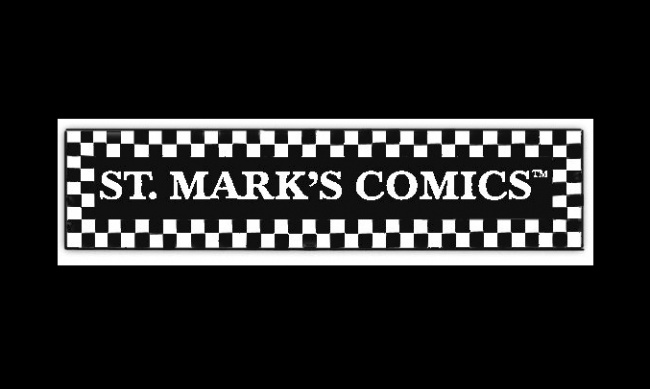In Business 3x3, a business retailer or executive will share their experience with three things they’ve done right, three things they’ve done wrong, and what else they’ve learned along the way.
Mitch Cutler is no longer working long hours, so he has a chance to look back.
Until very recently, Cutler was the owner/operator of St. Mark’s Comics in New York City. The store opened in May, 1983, and Cutler took over in November, 1984. For 35 years, St. Mark’s Comics was a beacon for readers in Manhattan, but all that changed in February, when the store closed its doors.
"There are many, many obstacles to running a retail shop in the city of New York," Cutler says. "And after 35 years of 90 hours a week, I had no more energy left to fight these many obstacles. I told many people I was having my Danny Glover moment: ‘I’m gettin’ too old for this s**t.’"
Cutler, now 53 years old, is thoughtful and deliberate. He speaks without a trace of bitterness, and remembers the good times very fondly.
"We had a good run," he says. "I want to leave it on a happy note. I don’t want to get into all the nuts and bolts issues of what exactly [the reason for closing] was, because it wasn’t a thing, it was 50 small things."
Cutler has the benefit of experience, and now the time, to truly reflect on what’s he’s done right and wrong.
THE GOOD
IDENTIFY AND TRAIN TALENT
Cutler is achingly proud of the staff that wound their way through St. Mark’s Comics over its history.
"Over the course of 35 years, we have found and trained an exceptional group of people that I will go to my grave knowing was the best staff any comic shop has ever had, and maybe the best staff any retail shop has ever had," he says. "You only have to look at where some of the kids have ended up and what they’re doing now."
Cutler loves his staff, past and present, but is reluctant to call them out by name.
"I don’t know how they would feel about being identified specifically," he says. "But somebody’s writing a network TV comedy show, several of them are working at important positions in the comic industry now. They’re all over the map—doctors, nurses, teachers. Super-talented kids doing important work."
Even with 35 years of experience, Cutler admits finding the right people is kind of like alchemy.
"If I could bottle that, I’d be making eight figures a year telling people," he says. "You gotta look them in the eyes. I’ve never been a believer in ‘I’ll look at a resume you emailed and decide that way.’ It’s about you, your temperament, your patience in dealing with the customer, your willingness to go that extra mile to make people happy. I don’t know what the right word is, but there’s a spark when I see it."
SERVE THE CUSTOMER
The right staff leads to treating the customer right.
"Our track record over 35 years… I’m sure you could look at any of a number of Facebook or Twitter posts over the last few weeks as people are remembering, and see how we took care of people, how we went way out of our way for people," Cutler says. "Our motto was always, ‘Find a way to say yes.’ And however that had to get done, pretty much anything we could do to match a customer to a book, we did it."
Cutler is proud of his customer service level, which sprung from his stock level.
STOCK WIDE AND DEEP
"From the very first day, we started with the idea that we were going to carry absolutely everything that’s published," Cutler says. "We had the widest and deepest selection of unusual material."
Cutler is happy that they were able to make a love connection between readers and books, and do it frequently.
"We had people say, ‘I found this weird, goofy thing I didn’t even know I wanted, and I found it at St. Mark’s.’ So I think we did that well.”
THE BAD
DON’T STOCK WIDE AND DEEP
But sometimes boons can come with a bane.
"Well… we carried everything that was published!” Cutler says. "In our quest to unite every customer with the perfect book, maybe there were some things we shouldn’t have carried, or at least cut faster. Maybe we should have said, ‘Well, this particular publisher is putting out very weak material and has been for six months. Maybe we need to take them out of the mix.’"
Cutler now sees subpar product as a problem that affects the industry.
"I know this may make some publishers unhappy, but if you see yourself in this comment, you may need to step your game up," he says. "Now I don’t know that anyone will read this and say, ‘God! He’s right!’ But if you’re a publisher who sees yourself in that… you need to step up."
LEARN TO INCORPORATE TECHNOLOGY
Cutler also sees a massive missed opportunity in his past.
"The number one giant thing—and this is on me—is that I failed to incorporate technology properly," he says. "I didn’t have any kind of online presence, really. We were using social media okay, but we needed a bigger presence."
Cutler says the day-to-day grind made it tough to work toward the future.
"When you’re up to your ass in alligators, it’s difficult to remember that the objective was to drain the swamp," he says. "And we were always up to our ass in alligators. We never made it the priority we needed it to be. But that’s on me, and that’s a big thing, the number one thing I did wrong."|
LOCATION, LOCATION, LOCATION
Cutler loved his store and the environment, but that love was bittersweet.
"I do not want to run down the city that I have lived in my entire life and love with all my heart, but it would be disingenuous to suggest that the laws and regulations of the city and state of New York did not have an effect on the health of our retail business," he says.
Regulations, taxes, and the whole kaboodle are cost of doing business wherever you are, but they can run high in New York.
"Is it something I did badly, being in New York?" he asks. "Does that qualify? I don’t know. But it’s a thing that had an unhealthy effect on my business."
AND WHAT ELSE?
"It’s not like it’s cheap to be on St. Mark’s Place. But you know what your rent’s gonna be; it’s on a sheet of paper. It’s not the reason we closed."
"We could go into the mechanics of the industry that are a problem… but that’s a different call. It’s extraordinarily difficult to have dispassionate conversations about the mechanics of the industry without people feeling attacked. If one is going to have that conversation, a lot of egos have to be put to the side. And that’s super-difficult."
"I was incredibly moved on March 1st, the day after we left the space physically. The staff threw me a party. There was staff that flew in from all parts of the world. I was… stunned. We must have had 100 former staff there. It was amazing, moving. These are great kids."
"I’m not sending you a mugshot. Because it’s not about me, it’s about the shop. There’s a picture of me that the New York Times ran 4-5 weeks ago that’s not so bothersome to me because it’s really shop-centric. If you can find that, God bless you. But I’m not sending you a mugshot."
"Y’know, we had a great run. We were lucky and privileged to have 35, 36 years in a place. Lots of places never get that. We had an amazing customer base that was sharp and literate and challenged us every day to find them interesting product, and they were super-gracious at the end. And we were lucky enough to have the best staff that ever was. I’m lucky and grateful to have made friends and acquaintances that I have to this day. So… yeah. It was 35 years of 90 hours a week, but it had a lot of rewards."

Lessons from 35 Years of Running a Comic Store in Manhattan
Posted by Jim McLauchlin on March 26, 2019 @ 12:51 am CT



